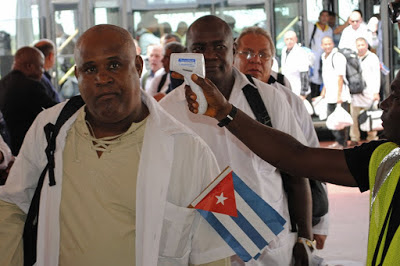Cuban doctors, like most Cubans, are tired of being enslaved.
Just yesterday I was justifiably calling The New York Times to task for a terrible piece on Communist China's record on women and in passing highlighted the paper's shameful past of covering up Josef Stalin's genocide in Ukraine and assisting Fidel Castro's rise to power in Cuba. Today Ernesto Londoño, the modern descendant of Herbert Matthews, managed to somewhat surprise me with an article titled "Cuban Doctors Revolt: ‘You Get Tired of Being a Slave’" with an introductory paragraph that indicted the Castro regime and reflected internal dissent:
Unfortunately in the drive to normalize relations with the Castro regime the previous Administration also watered down its report on human trafficking in Cuba, giving the Cuban dictatorship a pass. This drive was aided and abetted by The New York Times and Mr Londoño the fruits of which we are seeing now with over 20 diplomats badly injured in mysterious attacks and the U.S. Embassy in Havana effectively shutttered.
The New York Times article on the Cuban medical doctors revolt gives me some hope that the paper may finally be changing its ways, but the past 85 years also tells me to remain skeptical.
 |
| Cuban doctors trafficked and exploited by the Castro regime |
"In a rare act of collective defiance, scores of Cuban doctors working overseas to make money for their families and their country are suing to break ranks with the Cuban government, demanding to be released from what one judge called a “form of slave labor.” Thousands of Cuban doctors work abroad under contracts with the Cuban authorities. Countries like Brazil pay the island’s Communist government millions of dollars every month to provide the medical services, effectively making the doctors Cuba’s most valuable export."
This is news because it is being reported in The New York Times, that for decades has sought to spin a pro-regime narrative in its pages. In 2008 The Miami Herald reported that "more than 31,000 Cuban health workers -- most of them doctors -- who
toil in 71 countries brought in $2.3 billion last year, ...,
more than any other industry, including tourism. Most of them are paid $150 to $375 a month, a small percentage of the
cash or trade benefits the Cuban government pockets in exchange for their
work."
Juan Alfonso, a Cuban doctor, living and practicing medicine in
Chile, was interviewed by the PanamPost on October 15, 2015 and
explained why he had to flee his homeland, "I will tell you something: I would have liked to stay in Cuba. I left
because I could barely afford to buy a single egg to eat a day." The New York Times Editorial Board in 2014 was trying to spin that Cuban doctors were fleeing to the United States
because of the Cuban Adjustment Act and a special immigration program that sought to exacerbate a brain drain in Cuba.
Londoño repeats the argument in this article to soften the cruel reality that "President Barack Obama in January [2017]
ended the program, which had allowed Cuban doctors stationed in other
countries to get permanent residency visas for the United States."
Londoño's article focuses on Cuban doctors in Brazil, appealing to the courts for the right to stay there, and Brazilian judges who view their treatment as modern day slavery. These professionals are spread around the world, but there have also been other cases of Cuban workers in brutal conditions not mentioned in Mr. Londoño's article.
In 2006 the case of Cuban workers forced to work 112 hours a week for 3 cents an hour
in Curaçao made the news. The workers had been unpaid; their
compensation was deducted from Cuba’s debt to the Curaçao Drydock
Company. Three workers sued the company accusing "Curaçao Drydock Company of subjecting them to forced labour in a lawsuit in US federal court under
the Alien Tort Claims Act and other laws. They alleged that the company
conspired with the Cuban Government to traffic them and other workers
to Curaçao to work for Curaçao Drydock Company as part of a forced
labour programme."
Unfortunately in the drive to normalize relations with the Castro regime the previous Administration also watered down its report on human trafficking in Cuba, giving the Cuban dictatorship a pass. This drive was aided and abetted by The New York Times and Mr Londoño the fruits of which we are seeing now with over 20 diplomats badly injured in mysterious attacks and the U.S. Embassy in Havana effectively shutttered.
The New York Times article on the Cuban medical doctors revolt gives me some hope that the paper may finally be changing its ways, but the past 85 years also tells me to remain skeptical.





No comments:
Post a Comment